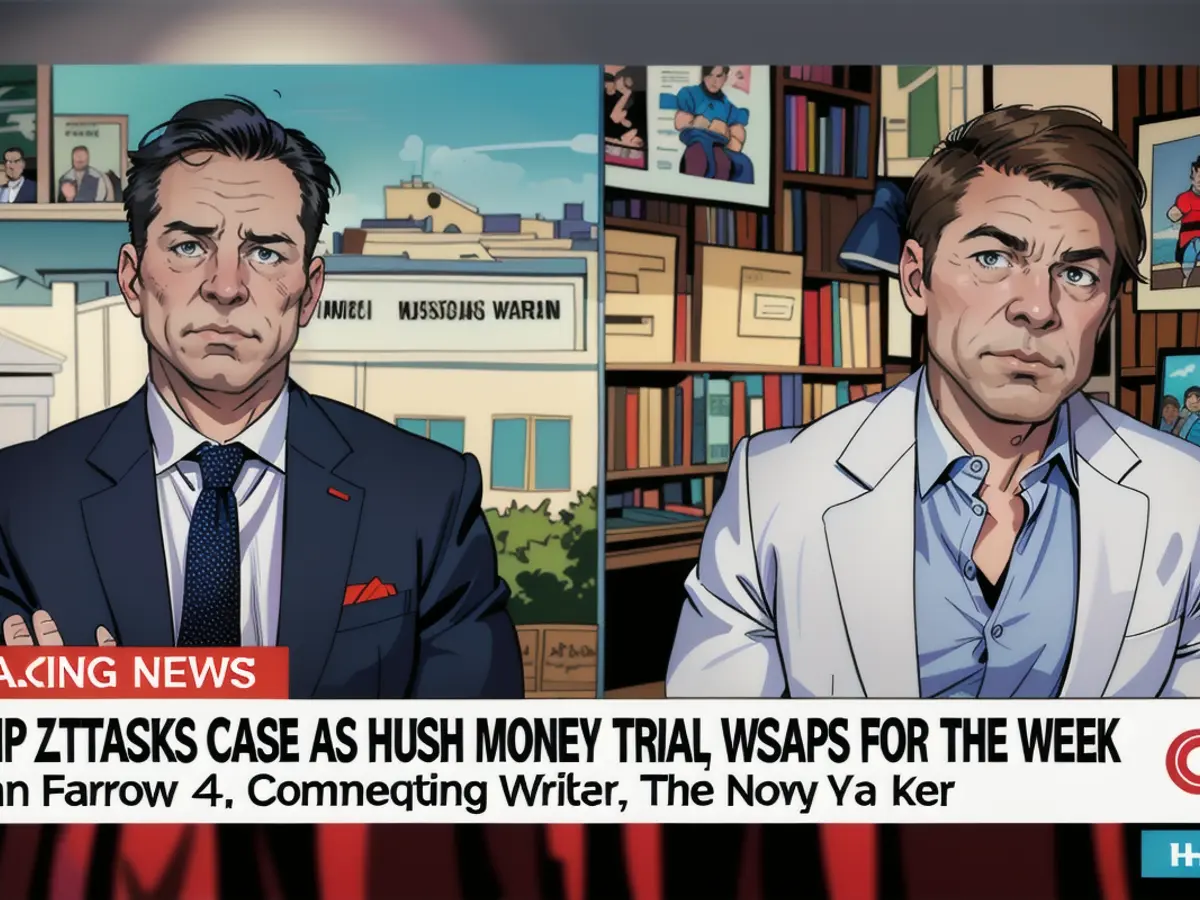How could the reversed Harvey Weinstein verdict impact the Donald Trump hush money trial?
The New York State Court of Appeals made a significant decision that reversed Harvey Weinstein's 2020 rape conviction. In a 4-3 ruling, the court stated that the jury might have been biased against Weinstein because the judge permitted women to testify about non-case-related allegations, supposedly to demonstrate his motives.
The court emphasized, "It is our solemn duty to meticulously safeguard these rights regardless of the crime involved, the reputation of the accused, or the pressure to convict."
The ruling focused on two questionable rulings in the Weinstein trial: the "Molineau" ruling, which allowed testimony from three other accusers, and the "Sandoval" ruling, which granted prosecutors the liberty to question Weinstein regarding a plethora of irrelevant misbehavior if he chose to testify.
Several legal experts think that this judgment might influence the ongoing trial against former President Donald Trump in Manhattan. Judge Juan Merchan, the trial's presiding judge, is subject to the same guidelines as the Weinstein trial judge.
Attorney Douglas Wigdor, who has defended many of Weinstein's accusers, including a witness from the Molineau ruling who appeared in court during the 2020 trial, even told CNN, "If I were defending Trump, I would've been in court that very morning displaying this decision before the judge's face, inducing him to reconsider his Molineau and Sandoval ruling. I would be requesting a mistrial at this point—they've already admitted the evidence that the judge had depended on."
Although such witnesses exist in prior bad act cases, the appeals court ruled that they were used to infer culpability, which is prohibited.
Trump faces 34 counts of falsifying business records associated with hush money payments made to adult film star Stormy Daniels. He has pleaded not guilty.
It's unclear if prosecutors will call Karen McDougal to testify, but her evidence could be disputed because Trump's supposed romantic liaison with McDougal, as well as the hush money payment she received, are not part of the indictment. (Trump has denied engaging in an affair with her and Daniels.)
In March, Merchan ruled that McDougal's testimony regarding the hush money payment can be presented in court, though he forbade the parties from probing the specifics of their interactions.
Stephen Gillers, a professor of law at New York University, highlighted the influence the Weinstein ruling would have on Merchan.
"This trial is the most consequential he'll ever manage. He doesn't want to jeopardize a potential conviction through a reversal by a higher court," Gillers stated.
"The Molineau issue will be a critical factor in this case," observed Debebah Tuerkheimer, a former Manhattan prosecutor and current law professor at Northwestern University. "It's eye-opening—the judge's early decisions on evidence may have more weight than we initially thought."
Although disagreeing with the Weinstein ruling, Judge Madeline Singas expressed her dissent, stating, "This finding removes the context the jury needs, impedes the prosecutor's ability to demonstrate intent, neglects the nuances of sexual misconduct, and demonstrates the majority's aloofness about the dynamics of sexual assault. Because New York's women deserve better, I dissent."
Prosecutors announced their intention to re-try Weinstein later this year.
The Crucial ‘Sandoval’ Ruling
The ruling on whether Trump will testify in his own defense may be the most significant consideration in light of his expressed desire to do so.
The Weinstein appeals court severely criticized the Weinstein judge's Sandoval ruling, which permitted the prosecution to cite various unsavory deeds had Weinstein taken the stand. They deemed this ruling "breathtakingly broad, including conduct that was abhorrent but not the type of behavior that would aid the jury in assessing his credibility."
The Sandoval ruling is tailored to New York state and regulates how courts should determine whether a defendant's past shortcomings can be introduced into the trial. The hearing, which traces back to a 1974 murder case against Augustin Sandoval, was named after the judge who limited what could be brought up when prosecuting Sandoval.
Merchan's Sandoval decision outlined the particulars of what prosecutors may question Trump should he take the stand. Based on this ruling, prosecutors would be permitted to inquire about the civil case that found him and others guilty of systematic financial fraud, Trump's infringements of a gag order in the same case, and Trump's loss in a civil defamation case initiated by E. Jean Carroll.
As per Gillers, "He stated that he would grant permission for cross-questioning on the gag order violations, which might have been an unwise decision. Trump will proclaim he intended to testify, but the overbroad Sandoval verdict impeded his constitutional right to do so."
However, Merchan forbade prosecutors from inquiring about two other proceedings.
"[Merchan] decided he'd allow cross-examination about the gag order violations, which might've been ill-advised," Gillers asserted.
"Sandoval is important because it establishes how far a judge can allow the introduction of prior misconduct in a trial and the type of misconduct that can be accepted," remarked professor of law Kathleen Kim at Virginia's William & Mary Law School. "The Weinstein case has altered it, and the Trump trial would serve as another test case."
Tuerkheimer stated she thought Merchan's judgment appeared to be rather limited, and that the judge had been cautious in explaining what exact actions the prosecution could question Trump about. Essentially, she said, Merchan demonstrated his concentration on evidence much nearer to the criminal accusations Trump is facing.
"The types of negative conduct or misconduct involved are distinct in Weinstein and Trump, and in Trump's prosecution you don't have the same procession of witnesses," Tuerkheimer added.
Weinstein wished to testify, lawyer claims
Lawyer Arthur Aidala, who defended Weinstein in his appeal, explained to CNN that Trump experiences the same quandary Weinstein faced during his trial.
Aidala said the witnesses and evidence that were permitted in the Weinstein trial played a vital part in Weinstein's ultimate choice to withdraw from the stand.
"No one in their right mind would testify based on the ruling of what prior bad acts he could cross-examine on," Aidala disclosed to reporters following the initial announcement of the ruling. "Harvey will, under this new ruling, be able to take the stand and share his side of the story."
Although Weinstein wished to testify, Aidala explained the decision over what he could be questioned about throughout cross-examination prompted him to abstain from doing so.
The ruling in the Weinstein case could offer hints about what a prospective appeal may entail if Trump is found guilty.
Gillers noted the Weinstein ruling wasn't simply weighing on the judge's thoughts. It has possibly provided the prosecution with a roadmap of what pitfalls to avoid as they await an opportunity to cross-examine Trump.
"The shrewdest move for the People currently is to agree not to present any prior bad act evidence if Trump testifies – challenge his bluff. He won't testify, but he also won't have a Sandoval argument on appeal."

Read also:
- Year of climate records: extreme is the new normal
- Precautionary arrests show Islamist terror threat
- UN vote urges Israel to ceasefire
- SPD rules out budget resolution before the end of the year
This Weinstein ruling might cause legal experts to advocate for a reconsideration of the "Molineau" and "Sandoval" rulings in Trump's trial.
Attorneys might argue that allowing testimony about non-case-related allegations could potentially bias the jury against Trump, similar to the impact it had on Weinstein's trial.
Source: edition.cnn.com








